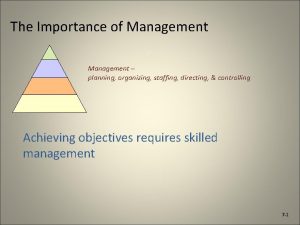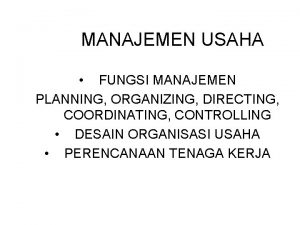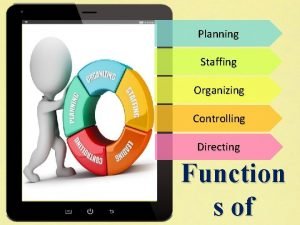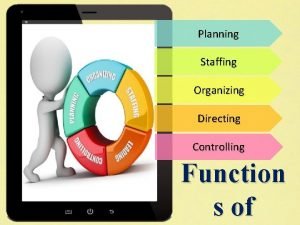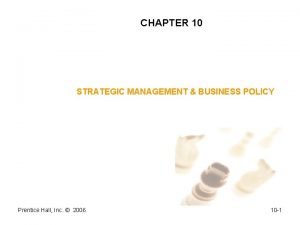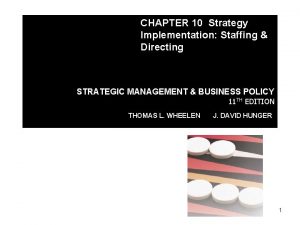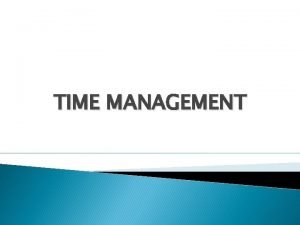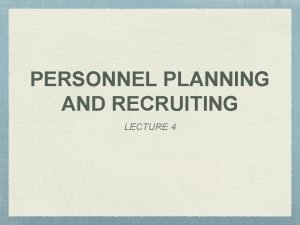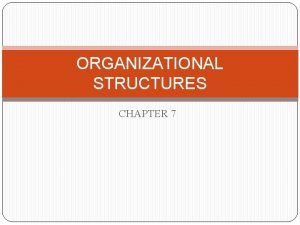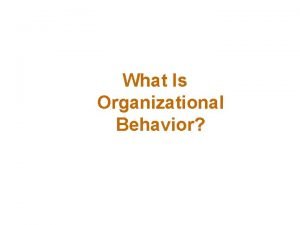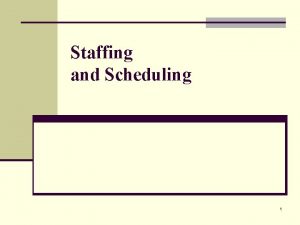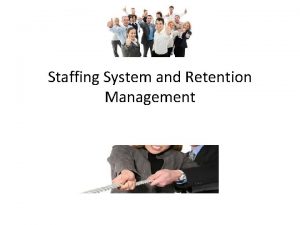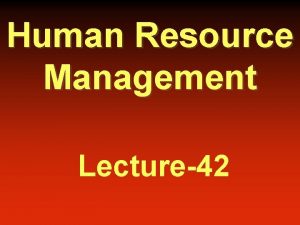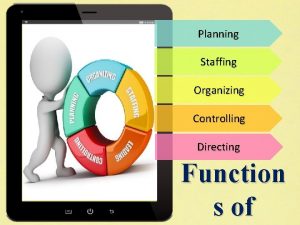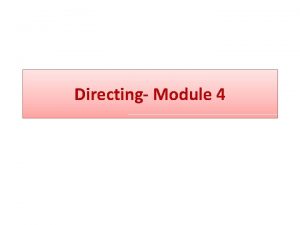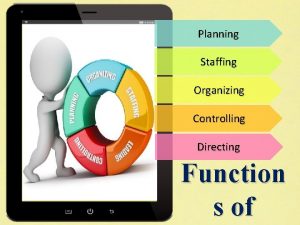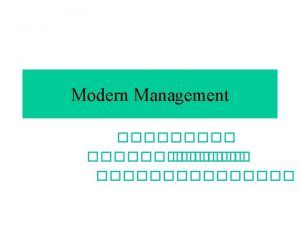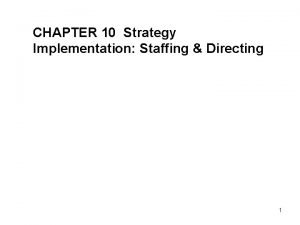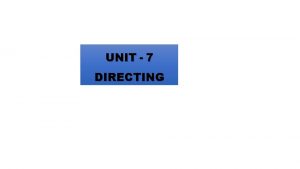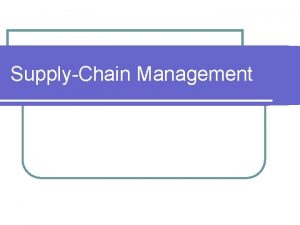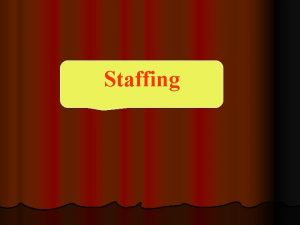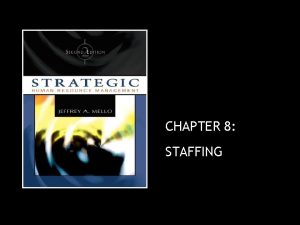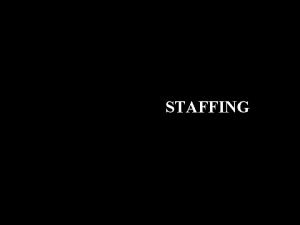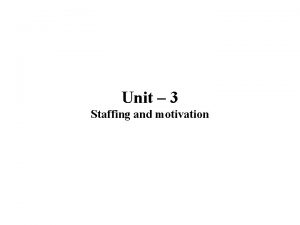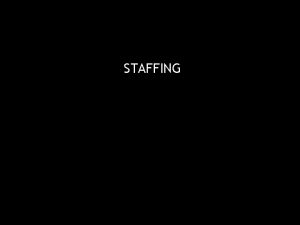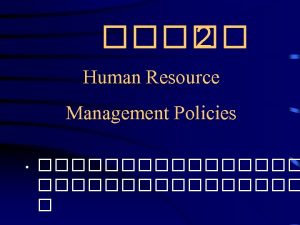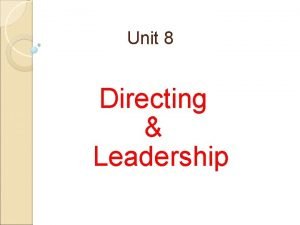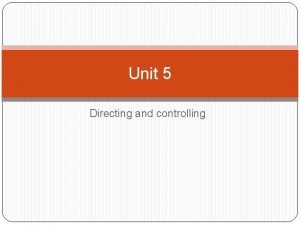The Importance of Management planning organizing staffing directing


































- Slides: 34

The Importance of Management – planning, organizing, staffing, directing, & controlling Achieving objectives requires skilled management 7 -1

The Importance of Management Process designed to achieve an organization’s objectives by using its resources effectively & efficiently in a changing environment. 7 -2

The Importance of Management What Managers Do Make decisions – utilization of resources – achieve objectives: • Planning • Organizing • Staffing • Directing • Controlling 7 -3

The Importance of Management Resource acquisition & coordination Resources • People • Raw materials • Equipment • Money • Information 7 -4

Management Functions Planning – Process of determining the organization’s objectives and deciding how to accomplish them. 7 -5

Management Functions: Planning Objectives – results desired by organization Mission – organization’s purpose and philosophy 7 -6

Management Functions: Planning Objectives Common & Elaborate Organizational Objectives - • Profit, competitive advantage, efficiency, growth • Service, ethics, community responsibility 7 -7

Management Functions: Planning Plans Strategic Plans Tactical Plans Operational Plans 7 -8

Management Functions: Planning Strategic Plans Executive level managers • Establish the long-range objectives & overall strategy to fulfill firm’s mission • 2 -10 years forward-looking • Sustainability • diversification, divestiture , mergers & acquisitions, 7 -9

Management Functions: Planning Tactical Plans Short-range – strategy implementation • 1 year or less • Environmental change • Periodically reviewed & updated 7 -10

Management Functions: Planning Operational Plans Very short-term – actionable, specific • Individuals, work groups, departments • 1 month, 1 week, 1 day • Achieve tactical plans 7 -11

Management Functions: Planning Crisis Management Contingency Planning Focus on potential disasters • Product tampering • Oil spills • Fire, earthquake, terrorist attack • Unethical/illegal employee activity 7 -12

Management Functions Organizing – Structuring of resources & activities to accomplish objectives efficiently & effectively. 7 -13

Management Functions: Organizing Importance – – – Creates synergy Establishes lines of authority Improves communication Improves competitiveness 7 -14 14

Management Functions Staffing – Hiring people to carry out the work of the organization. 7 -15

Management Functions: Staffing Importance – – – Recruiting Determine skills Motivate & train Compensation levels 7 -16 16

Management Functions: Staffing Downsizing – Elimination of significant numbers of employees (rightsizing, trimming the fat) 7 -17

Management Functions Directing – Motivating and leading employees to achieve organizational objectives. 7 -18

Management Functions -- Directing Motivation • Incentives (raise, promotion) • Employee involvement (cost reduction, customer service, new products) • Recognition and appreciation 7 -19

Management Functions Controlling – Process of evaluating and correcting activities to keep organization on course, 7 -20

Management Functions Controlling Five Activities – – – Measuring performance Comparing performance against standards Identifying deviations from standards Investigating causes of deviations Taking corrective action 7 -21

Types of Management Levels of Management – • • • Top management Middle management First-line/supervisory management 7 -22

Types of Management Top Management • President • Chief Executive Officer (CEO) • Chief financial officer (CFO) • Chief operations officer (COO) 7 -23

Levels of Management Rank CEO Company Total Compensation ($ millions) 1. Lawrence J. Ellison Oracle $192. 92 2. Frederic M. Poses Trane $127. 10 3. Aubrey K. Mc. Clendon Chesapeake Energy $116. 89 4. Angelo R. Mozilo Countrywide Financial $102. 84 5. Howard D. Schultz Starbucks $98. 60 The 5 Highest Paid CEO’s in 2007 7 -24

Types of Management Middle Management • Responsible for tactical planning • Implement general guidelines established by top management 7 -25

Types of Management First-Line Management • Supervise workers • Oversee daily operations • Directing and controlling primary functions 7 -26

Areas of Management • • • Finance Production and Operations Human Resources Marketing information Administration 7 -27

Areas of Management Financial Management – Focus on obtaining money necessary for the successful operations and using funds to further organizational goals. 7 -28

Areas of Management Production & Operations Management– Develop & administer activities to transform resources into goods, services, and ideas for the marketplace. 7 -29

Areas of Management Human Resources Management – Handle staffing function and deal with employees in a formalized manner 7 -30

Areas of Management Marketing Management – Responsible for planning, pricing, and promoting products and making them available to customers 7 -31

Areas of Management Information Technology (IT) Management – Responsible for implementing, maintaining, and controlling technology applications in business (computer networks) 7 -32

Areas of Management Administrative Managers – Manage an entire business or major segment of the business. Coordinate activities of specialized managers. 7 -33

Skills Needed by Managers • Leadership • Technical expertise • Conceptual skills • Analytical skills • Human relations skills 7 -34
 Staffing in management importance
Staffing in management importance Planning and direction adalah
Planning and direction adalah Directing function of management
Directing function of management Process of controling
Process of controling Directing function of management
Directing function of management Planning organizing staffing writing
Planning organizing staffing writing Staffing follows strategy
Staffing follows strategy Staffing issues in strategy implementation
Staffing issues in strategy implementation Staffing dan directing
Staffing dan directing Staffing and directing
Staffing and directing Staffing and directing
Staffing and directing Time management is the process of organizing and planning
Time management is the process of organizing and planning 8+8+8 time management
8+8+8 time management Process of directing
Process of directing Planning organizing leading and controlling
Planning organizing leading and controlling Planning and organizing in the workplace
Planning and organizing in the workplace Starbucks planning organizing leading and controlling
Starbucks planning organizing leading and controlling Personnel planning
Personnel planning Chapter 7 organizational structures
Chapter 7 organizational structures Basic ob model stage 1
Basic ob model stage 1 Staffing and scheduling in nursing management
Staffing and scheduling in nursing management Staffing system management
Staffing system management Crepetition
Crepetition What is staffing in management
What is staffing in management Steps of staffing function of management
Steps of staffing function of management Self-directing teams unleash
Self-directing teams unleash Is no2 para or meta directing
Is no2 para or meta directing Directing 101
Directing 101 Acylation of benzene
Acylation of benzene Activators and deactivators chart
Activators and deactivators chart Examples of meta directors
Examples of meta directors Trans effect
Trans effect Delegative leadership
Delegative leadership Project management chapter 4
Project management chapter 4 Methyl group ortho para directing
Methyl group ortho para directing
